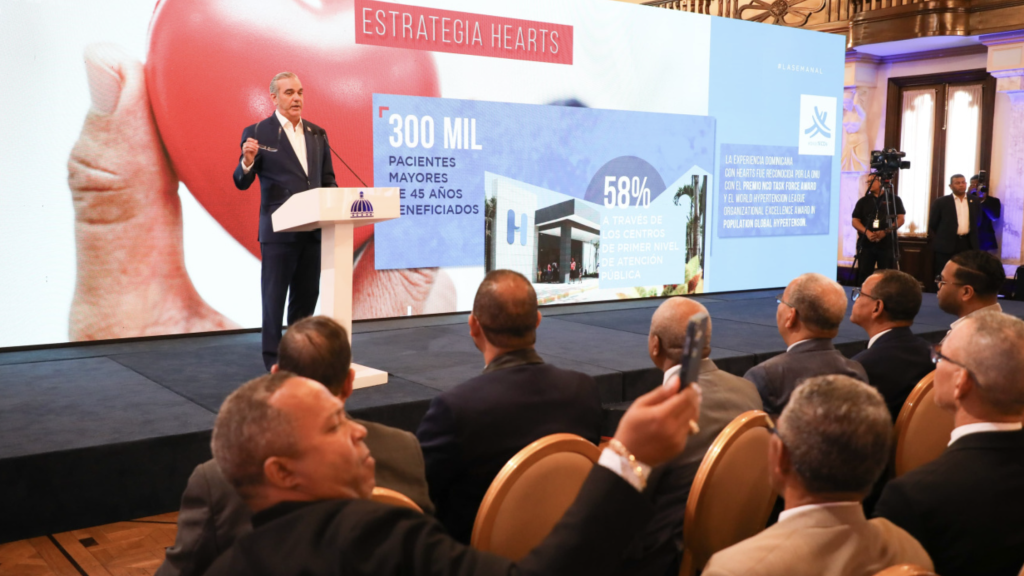
On occasion of his fifth year in government, President Luis Abinader took advantage of his weekly press presentation to present achievements of his government. A press release from the Presidency also highlighted the achievements. Abinader’s second term ends in August 2028.
“Today, we want to show the most important achievements — how we’ve broken the vicious cycle and replaced it with a virtuous one,” said the President who presented his achievements in health, education, security and the economy.
Health: Longer lives and better access
Life expectancy increased from 73.5 to 75.1 years, while infant mortality dropped from 20.9 to 15.9 per 1,000 live births. Teenage pregnancies declined from 74.4% to 67.9%. Meanwhile, 2.51 million new people were added to the social security system.
Under the National Hearts Strategy, 300,000 patients over age 45 received care, with 58% treated at primary public healthcare centers.
Hospital infrastructure saw major investment: 90 hospitals were built or upgraded, along with 625 first-level care centers and 272 facilities equipped with advanced medical technology. Five trauma hospitals are fully operational, with three more nearing completion.
Security: Homicide rate plummets
The homicide rate has fallen from 23.4 per 100,000 inhabitants in 2012 to just 8.3 in 2025. Overall crime is down 10% since 2019. The police force has been bolstered with over 4,000 new officers, salary increases, and 66 new police stations.
Housing and basic services: narrowing the deficit
The qualitative housing deficit dropped from 32.2% in 2018 to 27.6% in 2024. Access to clean drinking water increased from 81.8% to 86.5%.
Between 2020 and 2025, 15,518 new homes were delivered and 51,872 were improved. Additionally, 130,693 land titles were issued, benefitting over 522,000 people.
Economy and investment: Strong growth trajectory
Per capita GDP rose by 34.16%, from US$8,603 in 2019 to US$11,541 in 2024. Foreign direct investment hit a record US$4.5 billion, while total exports exceeded US$12.9 billion.
Tourism, free zones, and agriculture: Expanding output
Tourism surged by 48%. The free zone sector created 197,455 direct jobs — 55% held by women.
In agriculture:
Chicken production rose 44.1%
Egg output grew 38.1%
Egg exports soared by 553%
Milk production increased by 28%
Jobs and wages: Real gains for workers
From 2021 to 2024, 154,000 formal jobs were created. Female employment rose from 47.78% to 49.45%. The real minimum wage (non-sectorized private sector) rose 20.6% in dollar terms, jumping from RD$6,035 in 2012 to RD$19,450 in 2024.
Education: Increased access and quality
Early childhood education expanded with 87 new CAIPI centers, boosting coverage by 31.48%. Net enrollment in primary school rose to 92.6%, and secondary school enrollment reached 70.7%.
Technical and higher education:
INFOTEP delivered over 208,000 courses and trained 3.4 million people. The ITLA expanded from 8 to 55 centers. The UASD enrolled 173,750 new students and awarded more than 200,000 national and international scholarships.
Technology and innovation in education:
The national robotics education program reached 42,237 students between 2023 and 2025 through summer camps. It trained 5,283 teachers and technicians and supplied over 20,000 educational tools to 4,658 schools. Meanwhile, 3,701 students participated in STEAM and robotics fairs, presenting 909 innovative projects.
School transportation:
The government implemented a national school transport system (TRAE) now benefitting 200,000 students. A fleet of 1,871 buses operates across all provinces and the National District, boosting school attendance and reducing dropout rates, particularly in rural areas.
Energy: Renewables on the rise
Renewable energy generation increased from 15.9% in 2020 to 23% in 2025, with notable growth in solar and wind power.
Transparency and governance: Global recognition
The Dominican Republic improved its government effectiveness index by 22.3% and rose in international rankings for global competitiveness, economic freedom, and transparency perception.
Mining: A strategic area
The government says significant progress has been made in rare earth exploration in the bauxite deposits of Pedernales in the southwest. The government completed 100% of the geological mapping, identifying 84 deposits, laying over 21,000 meters of geophysical lines, excavating 585 trenches, and collecting 1,284 samples. Over half of the drillings are complete, positioning this as a key strategic project for the nation’s energy and mining future.
Agriculture: Boosting food security
From August 2020 to June 2025, the Agricultural Bank received more than RD$22 billion in public funding. Over 19,000 producers benefited from interest-free loans, reinforcing food security and rural productivity.
Looking ahead: Goals for 2028
President Abinader concluded by emphasizing that these results reflect steady progress toward comprehensive development, with improvements in quality of life, infrastructure, productivity, and public safety. The government’s agenda continues with ambitious targets for 2028, especially in healthcare, housing, and sustainable energy.
Read more in Spanish:
Presidency
Diario Libre
12 August 2025

